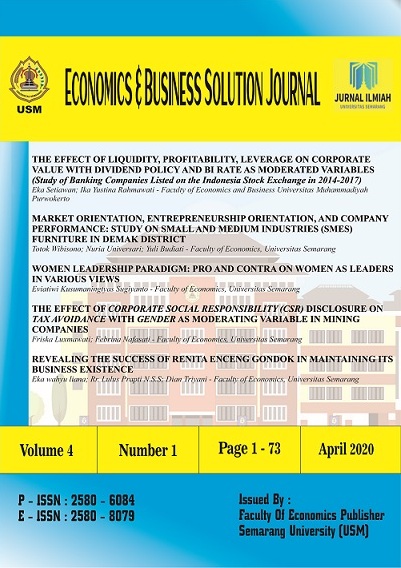Women Leadership Paradigm: Pro and Contra on Women as Leaders in Various Views
DOI:
https://doi.org/10.26623/ebsj.v4i1.2241Keywords:
Women Leadership, Pro & ContraAbstract
The number of female workers is increasing and its role in leadership is giving its own perspective on the topic of women leadership. Pro and contra phenomenon related to women leadership still exist in the society. In addition to explain the paradigm of woman leadership, this study also explains the pro and contra of women leadership from various perspectives and provides an overview of how the pro and contra emerge. The method that was used in this study is literature study from the Al-Quran, books, journals and studies. The findings of this study shows that women leadership style leads to transformational, democratic, collaborative styles and have high relational value. Leadership is left to follow one's worth and ability from either men or women. If someone meets the requirements and deserves to be a leader even though from the women's group this remains true. The emergence of pro and contra is based on different point of views; every point of view has different concepts which lead to different practices. The results of an interpretation are not only come from the methods and approaches used, but are also influenced by their socio-cultural and ideological conditions.
References
Adnan, A. (2016). Pandangan Kritis terhadap Pendekatan Feminis. El-Hikmah, 8(3), 80-94.
Anshori, M. A. (2015). Perempuan: Perspektif Filsafat, Tasawuf dan Fiqih. Al-Adyan: Jurnal Studi Lintas Agama, 10(1), 1-18.
Chin, J., L. (2004). 2003 Division 35 Presidential Address: Feminist Leadership: Feminist Vision and Diverse Voice Pyshocology of Women Quartely, 28, 1-8.
Chin, J., L. (2007). Overview: Women and Leadership: Transforming Visions and Diverse Voices. Retrieved from
Denmark, F., L. (1993). Women, Leadership, and Empowerment. Psychology of Women Quarterly, 17, 343-356.
Eagly, A. H., & Carli, L. L. (2003). The female leadership advantage: An evaluation of the evidence. The Leadership Quarterly, 14(6), 807-834. doi:10.1016/j.leaqua.2003.09.004
Fadilah, N., & Wahyudi, W. (2018). Tinjauan Hermeneutis Terhadap Hadis Kepemimpinan Perempuan Dalam Islam. FIKRI : Jurnal Kajian Agama, Sosial dan Budaya. doi:10.25217/jf.v3i2.350
Ford, J. (2005). Examining leadership through critical feminist readings. J Health Organ Manag, 19(3), 236-251. doi:10.1108/14777260510608961
Hakim, L. (2017). Mis-Interpretasi Ayat Kepemimpinan Laki-Laki Atas Perempuan (Kritik Terhadap Tafsīr Feminis). Studia Quranika, 1(2). doi:10.21111/studiquran.v1i2.848
Hamka, H. (2013). Kepemimpinan Perempuan dalam Era Modern. Al Qalam, 19(1), 107-116.
Hassan, Z. S., Abu Daud. (2008). Women Leadership and Community Development. European Journal of Scientific Research, 23(3), 361-372.
Ilyas, Y. (2002). Problem Kepemimpinan Perempuan dalam Islam. Tajrih, 3, 64-73.
Lanza, M. L. (1997). Feminist leadership through total quality management. Health Care Women Int, 18(1), 95-106. doi:10.1080/07399339709516262
Mas'ud, Fuad (2015). Menggugat Manajemen Barat, Mengungkap Pandangan Dunia Yang Tersembuyi yang Menjadi Dasar Konsep, Teori dan Praktek Manajemen Barat. In: Semarang: Badan Penerbit Universitas Diponogoro.
Meizara, E. D., Puspita, Basti. (2016). Analisis Kompetensi Kepemimpinan Wanita. Jurnal Imiah Psikologi Terapan, 4(2), 175-181.
Novianti, I. (2008). Dilema Kepemimpinan Perempuan dalam Islam Jurnal Studi Gender dan Anak, 3(2), 255-261.
Nurbaiti, N., & Syafieh, S. (2018). Potret Karakteristik Kepemimpinan Perempuan (Analisis Semiotika Surat Al-Naml: 23-44). JURNAL At-Tibyan: Jurnal Ilmu Alquran dan Tafsir, 3(1). doi:10.32505/tibyan.v3i1.477
Oplatka, I. L., Rachel Hertz. (2016). Women Principals in a Multicultural Society_ New Insights into Feminist Educational Leadership: Sense Publisher.
Rahim, A. (2016). Peran Kepemimpinan Perempuan dalam Perspektif Gender. Al-Maiyyah, 9(2), 268-295.
Rohmiyati, F. N. (2016). Hakikat Kepemimpinan Perempuan: Sebuah Refleksi Sejarah. An-Nisa', 8(1).
Salenda, K. (2012). Kepemimpinan Perempuan dalam Perspektif Islam. Al-Risalah, 12(2), 369-378.
Situmorang, N., Z. (2011). Gaya Kepemimpinan Perempuan. Proceeding PESAT (Psikologi, Ekonomi, Sastra, Arsitektur dan Sipil), 4, 129-135.
Smit, B. (2017). Female Leadership in a Rural School: A Feminist Perspective. Studies of Tribes and Tribals, 11(1), 89-96. doi:10.1080/0972639x.2013.11886670
Tohet, M., & Maulidia, L. (2018). Kepemimpinan Perempuan Perspektif Mufassir Nusantara. Jurnal Islam Nusantara,, 2(2), 211-231.
Yusuf, M. (2015). Kepemimpinan Perempuan dalam Perspektif Kearifan Lokal: Pemikiran Ulama Bugis dan Budaya Bugis. Journal of Social Science and Religion, 22(1), 69-81.
Downloads
Published
Issue
Section
License
The journal holds the copyright for each article published with work licensed simultaneously under a Creative Commons Attribution 4.0 International License, which allows others to share the work with an acknowledgment of the authorship and early publication of the work in this journal.







